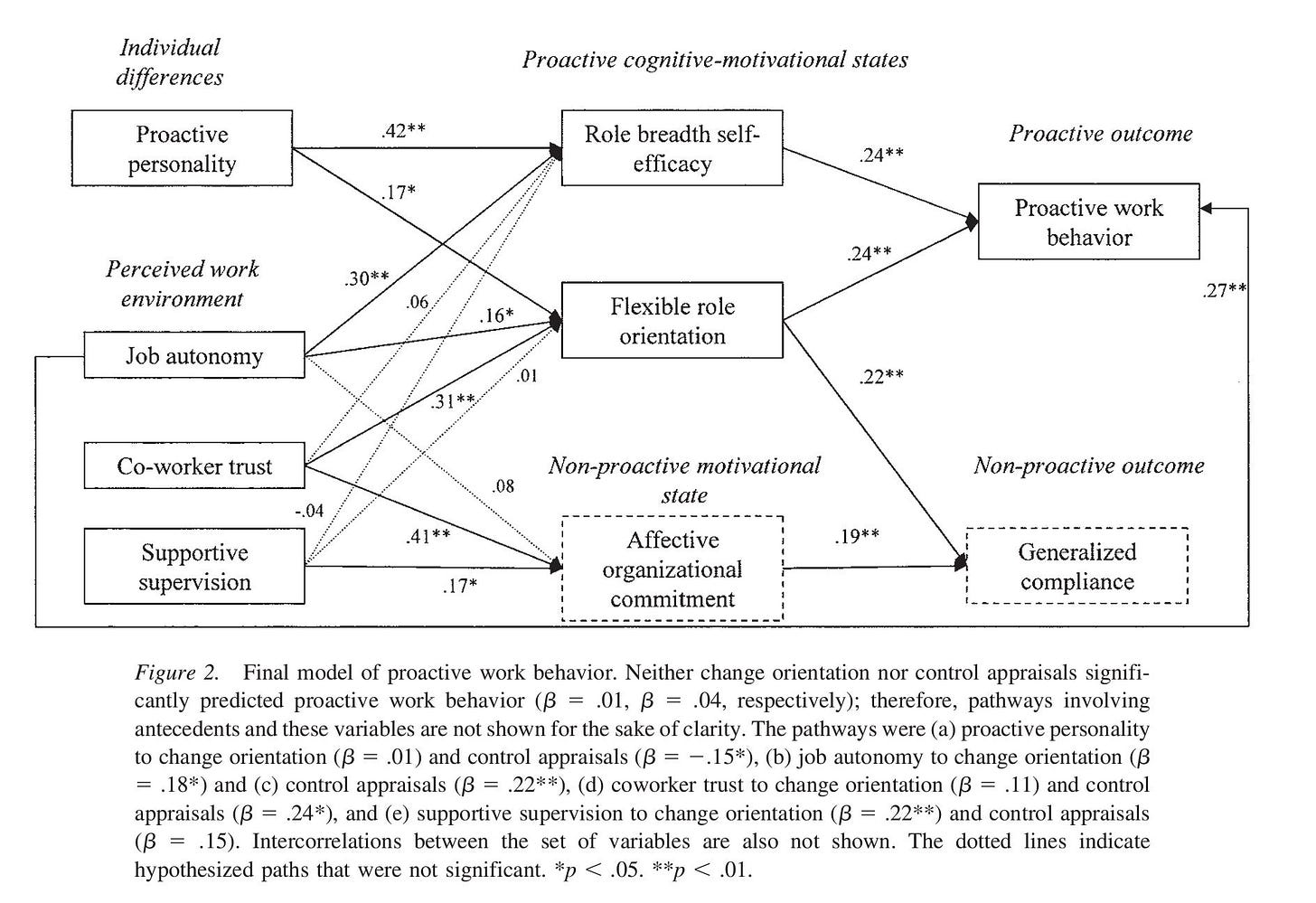
Do you want to know more?
Sources for this Article:
Grant, A. M., & Ashford, S. J. (2008). The dynamics of proactivity at work. Research in Organizational Behavior, 28, 3–34.
Parker, S. K., Williams, H. M., & Turner, N. (2006). Modeling the antecedents of proactive behavior at work. Journal of Applied Psychology, 91(3), 636–652.
Frese, M., & Fay, D. (2001). Personal initiative: An active performance concept for work in the 21st century. Research in Organizational Behavior, 23, 133–187.
Grant, A. M. (2013). Rocking the boat but keeping it steady: The role of emotion regulation in employee voice. Academy of Management Journal, 56(6), 1703–1723.
Corporal Sarsfield, T. (2021). Fostering Disciplined Initiative. NCO Journal, 1-3.
Amabile, T. M. (1996). Creativity in Context. Westview Press.
Ancona, D. G., & Caldwell, D. F. (1992). Bridging the Boundary: External Activity and Performance in Organizational Teams. Administrative Science Quarterly, 37(4), 634–665.
Mayer, R. C., Davis, J. H., & Schoorman, F. D. (1995). An Integrative Model of Organizational Trust. Academy of Management Review, 20(3), 709–734.
Disciplined Initiative.
Supporters need to take initiative in their jobs, especially in situations where leaders are not around, to reduce or stop failure, or to simply do what they think is best for the organization. This is the underlying concept of decentralized operations. If an employee is waiting to be told everything, then are they an asset or a hindrance to the mission? I think you will agree that you don’t want to work for a boss that micro-manages everything you do. You would say just give me an intent, why we are doing it, and generally what I need to accomplish. Then let me figure out the how.
But remember, the key to disciplined initiative is discipline. Supporters need to execute within the constraints and framework of their job description or work resources. Just as it is challenging to work in a business where leaders routinely ask you to go above your position description, it is just as challenging for leaders to watch supporters work outside their boundaries. A supporter who can understand, absorb, and follow the spirit or the intent of an order, will benefit their business.
Initiative in supporters goes beyond mere task completion. Supporters who display initiative take ownership of their roles, actively seek opportunities to contribute and demonstrate a genuine commitment to the team's objectives. According to Grant's (2013) research on prosocial motivation, supporters with initiative are more likely to engage in activities that benefit others, fostering a collaborative and achievement-oriented team environment. Supporters who take the initiative are better at proactive thinking.
Proactive Thinking.
We can look further to determine how to build proactive skills and behaviors. You may work in an organization that diminishes free ideas and initiative but research shows that the biggest effect of proactive thinking is you. Parker, Williams, and Turner (2006) cite that their research showed that first, proactive thinking is a deliberate decision, and second, proactive behaviors derive from a sense of a supporter's responsibilities. Individuals have the willpower to become proactive thinkers and not wait for someone to tell them what to accomplish.
Businesses can however foster climates that promote practice thinking. This will create a workplace that achieves greater productivity and success. “Three cognitive-motivational variables that reflect one’s assessments about the likely outcomes of engaging in proactive behaviors (role breadth self-efficacy, control appraisals, and change orientation) as well as on one variable (flexible role orientation) that reflects one’s goals, responsibilities, and aspirations within the work environment” (Parker, Williams, and Turner, 2006). Allow me to elaborate below on what these variables mean to a supporter:
Self-Efficacy: Develop competence to achieve tasks, be a master at your job, and you will develop confidence in taking proactive steps efficiently.
Control Appraisal and Job Autonomy: Requesting or integrating control mechanisms in your organization that allow supporters the flexibility to make decisions on a task increases proactive employees.
Change Orientation. Reducing no-fault organizations or building resilient supporters will allow faith in the system when proactive behaviors create negative outcomes.
Flexible Role-Orientation. Overly descriptive or micro-managing roles will destroy proactive behaviors while giving general role directives allows employees to create their successes.

A very important highlight from the Parker, Williams, and Turner (2006) study is reflected in the picture above is that each of the four factors influenced each other. Although proactive behavior stems from the supporter’s ability to stand up and show initiative, organizations that use all four principles above will have a compounding effect on their results. If you want personnel in your business to take charge when needed, within the boundaries of the operation, then implement these techniques.















